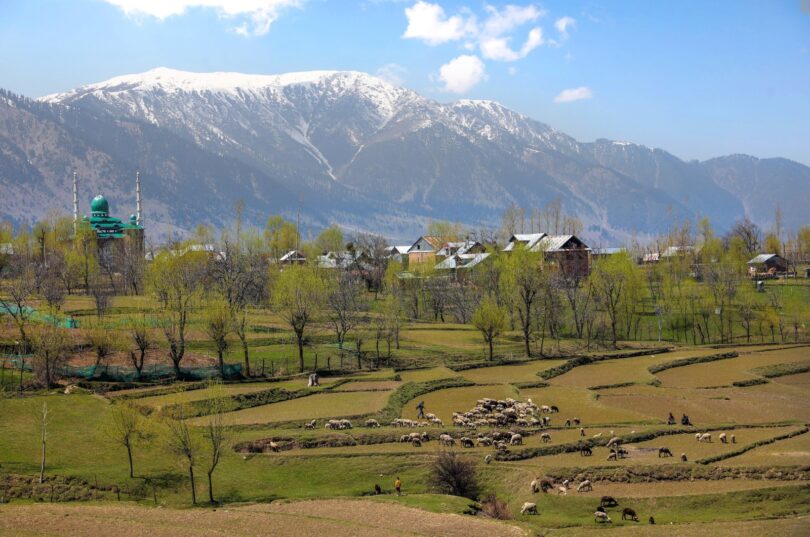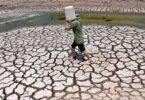SRINAGAR (AA): Plastic is the new gold. At least it may lead to gold as Farooq Ahmad Ganai in Indian-administered Kashmir has been running a program where people can bring in plastic garbage in exchange for gold.
Last year, a friend of the 51-year-old Ganai complained to him about the piles of garbage lying around in Ganai’s village, he was offended and hurt. Deep down, he wanted to bring change as he was holding the position of village head, or sarpanch, in his home village of Sadiwara in the Hiller Shahabad block of South Kashmir’s Anantnag district.
Ganai – a lawyer by profession – formulated a project where he would offer a gold coin for collecting plastic and polythene waste.
He launched the campaign with the slogan “Give Plastic and Take Gold” to cope with the challenges in solid waste management. In the campaign, he was joined by volunteers from the sanitation department, senior citizens, members of youth clubs and some employees from other departments. The campaign was formally approved by the district administration of Anantnag on Jan. 7.
Under the scheme, any person collecting 20 quintals (2,000 kilograms) of plastic waste from the village will get a 10-gram gold coin. There is also a smaller reward of a 5-gram coin for 10 quintals. For the reward, the village administration has started to collect a user fee of 30 rupees ($0.37) from around 400 households in the village.
Ganai said since the campaign’s launch, heaps of plastic and polythene waste have been collected in his village and it was a resounding success because people get rewards for collecting waste.
“People need some sort of motivation to do certain work, and this plan worked very well,” he said.
Within 15 days of the campaign’s launch, he said that at least 12 spots with an area of 1 kilometer in his village were cleaned. A local river, Pranigam, originating from the centuries-old Vatsta spring, was also cleaned.
Ganai said that in a span of four to five months since the campaign was launched, his village is now a litter-free zone. But he admitted that this cannot be a lasting solution to curb plastic and polythene use.
Banned but still in use
Since 2006, the High Court of Jammu and Kashmir and Ladakh has passed a series of orders banning the use of polythene and single-use plastics in the region. On the ground, however, there has been an increase in the use of polythene and plastic, and heaps of waste are being dumped on roadsides or near river bodies.
According to a policy document issued in 2018 by the regional housing and urban development department, the region generates over 3,000 metric tons of waste each day, with plastic waste accounting for more than 40% of garbage, and this will likely increase if steps are not taken to implement the rules for solid waste management in the region.
Shafkat Nazir, an advocate who filed a petition seeking the implementation of solid waste management rules in the region, told Anadolu Agency (AA) that it is unfortunate that the authorities are derailing the implementation of the rules despite many directives issued to them.
According to the rules, all local municipal bodies are enjoined to take appropriate action for the disposal and treatment of solid waste material in the region.
However, one of the officers from the Srinagar Municipal Corporation told AA that for the rules to be implemented there is a need for manpower, infrastructure and more landfilling sites.
In the Kashmir region, there is only one landfill in the capital city Srinagar, which has been declared a health hazard as it emits a bad smell.
“You are collecting the waste and throwing it in the landfill site, with most of it not being properly treated or disposed of. It will stink more and more and will seriously impact people’s health,” Nazir said.
He added that a number of petitions have been filed before courts against municipal bodies that are dumping hazardous wastes near water bodies.
“You need awareness and implementation of the rules on the ground. Otherwise, it is hard to change the situation,” Nazir said.
Small steps can bring big change
Back in his village, Ganai is looking to adopt a mechanism to transform the plastic and polythene waste into items that can be used to beautify paths or in decorations.
“I am thinking about this issue more holistically. Although the collection of waste is important, we need to segregate it and make it usable in some form or dispose it properly,” he said.
He also said people need to be sensitized about the dangers of littering, as this impacts the environment, water bodies, forests and agriculture.
Ganai is hopeful that people in his village will continue to support him in this process and others will follow the course.
He said more than 35 surrounding villages have started to replicate the idea.
“These small steps give me some hope that we can do good to our environment, if not the best for it,” he said.
Riyaz Ahmad Shah, the assistant commissioner of Anantnag, told AA that the campaign has received a good response and they are making it applicable in all villages.







